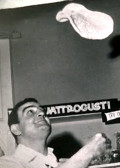
Directed by
Shannon Swan / Angelo Pricolo
90 minutes
Rated PG
Reviewed by
Sharon Hurst

Lygon Street: Si Parla Italiano
Synopsis: A look at the wave of Italian immigration flowing to Melbourne after World War 2 and the pioneers who headed to Lygon Street, made a little piece of their homeland for themselves, and opened up a new way of life for Australia.
Any Melburnian who has a fondness for wandering Lygon Street, indulging in its many culinary offerings, and simply soaking up the Italian atmosphere should adore this film. But don’t kid yourself it’s only about the food – there is a wondrous amount of fascinating history here too, much of it centring around the main players who made the street what it is today.
Back in 2009, the filmmakers conducted 40 interviews to try to find the people considered most instrumental in shaping the street. Eight notables were then gathered together round-table style over lunch, to reminisce and celebrate their street. Among them are Giancarlo Giusti, who started Grinders Coffee in the 1960s, Salvatore Della Bruna, founder of Toto’s Pizzeria in 1961 and John Portelli who founded the Lygon St Foodstore in the late 1950s. The personal reminiscences of these colourful pioneers are interwoven with archival footage and an illuminating commentary by Anthony LaPaglia. Most of these pioneers are now in their 70s or 80s, some have passed on.
After a wonderful opening credits sequence of names and faces in passports being stamped, we hear recollections of early migrants ending up at Bonegilla migrant centre, where the unfamiliar food was so ghastly they set up their own kitchen. The story of the first imported coffee machines is told, and how Aussies were totally in awe of then, even some of the Italian immigrants themselves having no clue how they were operated. When University Café opened its doors the chefs had to send back to Italy to get authentic recipes and when Italian pastry chefs came to Melbourne for the 1956 Olympic Games, one of them stayed on and set up Brunetti’s, still going strong today. In 1958 when La Gina’s opened they got calamari for free from the Vic Market as no-one had any idea what to do with it. Pizza was regarded with suspicion, until Toto’s changed all that and Aussies took to the food like ducks to water.
Some daunting stories of early racism get an airing. Clips are shown from some early films of Giorgio Mangiamele (Il Contratto, Ninety-nine Per Cent, The Spag) in which Italian immigrants suffer humiliation at the hands of Australians railing against anything non-Anglo-Saxon. We learn of the start of the newspaper Il Globo in 1959, and of how Carlton had a reputation as a rough and seedy part of town. Mick Gatto puts in his two-bob’s worth, detailing some of the many illegal poker games that took place at L’Alba, and explaining how murdered gangster Alfonse Gangitano, “added flavour” but harmed the reputation of the street.
Later changes are also documented, with the advent of boutique theatres like La Mama and the Pram Factory, and trendy wine bars like Jimmy Watson’s. When the whole area was tagged for demolition fortunately that was fended off, leaving a lot of the original architecture intact. And just when it was thought that gentrification of the street had stripped it of its authenticity along comes a new wave of young Italian immigrants – refugees today from the GFC in Europe. It seems that a new type of authenticity is building, although the pioneers bemoan the passing of a unique era.
The affection with which the film has been made is apparent, and may even make us see more recent immigration with a softer eye. If the once maligned Italians are now such an essential part of our lives, who knows what the future holds?
There’s a huge amount of buzz around this film and justifiably so. This is a part of our country’s history, it has defined our city, inspired most other Australian capitals to create a “Little Italy”, and, most of all, ingrained itself into our daily lives with a joyousness and irrepressible spirit uniquely Italian.

Want more about this film?


Want something different?




